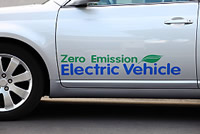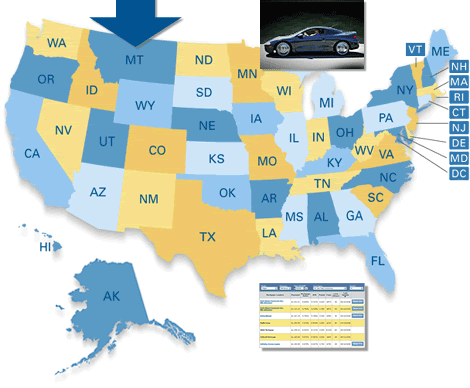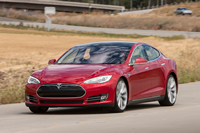Driving an Electric Car
by Amy Lillard
(3/31/2013) Electric cars may be the future of the automotive industry. Cars like those manufactured by Tesla represent an exciting new advancement for consumers and the environment. But what do you need to know when considering an electric car? In this series, we examine key information to help you step into the future.
Electric cars are a relatively new phenomenon to the modern automotive landscape. It’s natural, then, that there are multiple misconceptions and misunderstandings about the electric car. With decades of practice using gas-powered cars, the notion of an entirely different type of car leaves a few drivers a little lost.
Take the driving experience, for example. Many people believe that driving an electric car is significantly different than their old standby. They lack speed, or they lack acceleration. They take the fun right out of driving.

The truth is the driving experience is quite a bit different for electric cars, but in many ways that drivers may actually enjoy.
• Peace and quiet. People who have taken a test drive or taken the plunge and purchased an electric car remark upon one thing that’s missing — noise. Start up an electric car, and the quiet is noticeable. Without the machinery involved in a typical car, drivers will feel and hear little to nothing. There are no fixed gears or shifting due to continuously variable automatic transmission. So it’s a decidedly smooth start and finish to the ride.
• Powering up and down. Drivers will notice different gauges in their electric cars tracking the charge level instead of engine speed. Plus, most have a normal driving mode and eco mode, restricting acceleration to conserve battery. When stopping in traffic the car will essentially shut down while still allowing for accessory function.
• Stopping and starting. In gas-powered cars, there is always a lag for acceleration, allowing for power to be built up. With electric cars power is instantly available allowing for quick acceleration. They’re quite responsive and sensitive, with “instant torque.” On the opposite side, electric car brakes act quickly for rapid deceleration, quicker than some drivers are used to. These cars use “regenerative” braking, using energy from braking to recharge batteries.
• Range. Drivers of electric cars do have be cognizant of the distance they’re driving and the amount of charge. Knowing what things are a drain on the battery, including accessory use and air conditioning, is important. However, the same could be said for gas-powered cars. These vehicles are equally dependent on refueling, just with a more expensive resource. They also experience reduced efficiency, speed and range with use of these features.
Other related articles:
Top 5 Reasons to Buy an Electric Car
Electric Cars: Is it Right for You?
Electric Cars: Buying Considerations
Electric Cars: Top 5 Things to Know
Automotive Loans: Determining a Down Payment
Automotive Loans: The Truth About "Add-Ons"
Automotive Loans: Negotiating a Loan with a Dealer
Automotive Loans: How Much Car Can You Afford?
Automotive Loans: Applying for a Car Loan
High MPGs and low auto loan rates can save you thousands of dollars
Research your options when shopping for an auto loan
Closed End Lease or Open End Lease
New and Used Auto Loan Rates
Choose Your State Below

Start by selecting your state

Amy Lillard
The ERATE® Resource Guide to No-Closing-Cost Refinancing
Principal Reduction: New Programs, More Controversy
Understanding Mortgages: Mortgage Paperwork
Understanding Mortgages: Types of Mortgages
Understanding Mortgages: How to Get a Mortgage
Understanding Mortgages: Buy or Rent?
Understanding Mortgages: Working with a Real Estate Agent
Understanding Mortgages: Working with a Real Estate Agent

Automobile Buying/Financing
5 Steps to Find the Perfect Car
Auto loan defaults to rise 7 percent in 2010
Auto Show Season Tips for Buyers
Consumer Reports suspends recommendations for Toyota's recall models
When is the Best Time to Buy a New Car?
Making a Vehicle Purchase? Enjoy These Helpful Tips
Chances are, your next car will be used. Drive a hard bargain
What your car is really saying
2012 President's Day auto sales among best ever
Special Report: Hitting the Brakes on Auto Dealer Loans
Auto Insurance
Buying Ins - Shopping for Insurance
Best Car Insurance Plan for You


